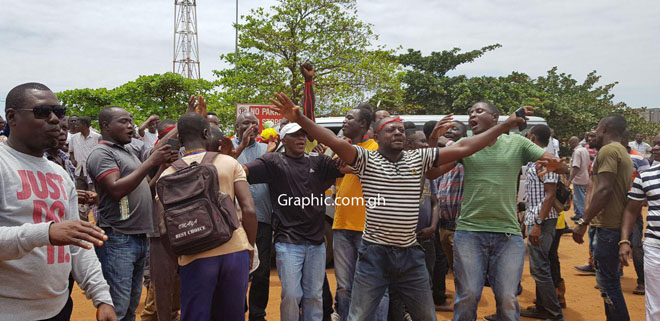
Tanker drivers call off intended strike
Members of the Ghana National Petroleum Tanker Drivers Union (GNPTDU) have called off their strike barely 24 hours after declaring their intention to withdraw their services due to poor conditions of service.
Members of the union had, by 8 a.m. yesterday, gathered at the frontage of the Tema Oil Refinery (TOR) to protest, in view of their grievances, such as ineffective flow meters at some storage depots of the Bulk Oil Storage and Transportation Limited (BOST), which the protestors accused the National Petroleum Authority (NPA) of failing to address.
Others were low wages and underground shortage deliveries.
The union, in an attempt to drum home the intended action of its members, instructed them and those of a rival union, the LPG Tanker Drivers Union, not to cart Liquefied Petroleum Gas (LPG) from the refinery for distribution.
Chaotic scenes
The situation degenerated into chaos, leading to the arrest of the Secretary of the union, Mr David Konadu, and four other members of the union.
Two other members of the group were hit by rubber bullets fired by the police, who also used tear gas to disperse the drivers from the frontage of the TOR.
![]()
Mr Alhassan Tampuli (left) in a handshake with Mr J.K. Horgle, Patron, Tanker Owners Union, after the meeting.
NPA meeting
But after a meeting with officials of the National Petroleum Authority (NPA), the General Secretary of the Transport, Petroleum and Chemical Workers Union of the Ghana Trades Union Congress (TUC), Mr Fuseini Iddrisu, confirmed the end of the strike to journalists.
Mr Iddrisu informed journalists that one of the outstanding issues was the implementation of an MOU the parties signed last year to tackle problems associated with the letters of appointment, medical care,
Present at the meeting were officials of the NPA, the Petroleum Workers Union of the TUC, the Ghana National Petroleum Tanker Drivers Union, the BOST Drivers Union, GOIL Drivers Union and a representative of the Association of Oil Marketing Companies.
NPA boss
The Chief Executive Officer (CEO) of the NPA, Mr Alhassan Tampuli, told journalists that two issues, namely, the surcharging of losses on tanker drivers by fuel depots and remuneration, would be looked into.
Another item, he noted, had to do with underground shortages and said the oil manual was expected to be adhered to fully by all parties.
“We have also agreed that BOST will rectify the flow meters which some of the parties think are a bit defective,” Mr Tampuli said.
He said it was also agreed that matters arising in the industry would be addressed by “all stakeholders at a roundtable”.
Mr Tampuli said the memorandum of understanding (MOU) between the parties would be revisited to tackle issues arising from it.
Background
The drivers wanted the NPA to ensure the full implementation of the contents of the Petroleum Producers Transportation Delivery Retail and Loss Control manual which was formulated by the Energy Commission in 2004.
The manual contains directions on how to load and offload petroleum products, as well as other operational activities.
According to the drivers, since many fuel refilling stations did not adhere to the guidelines in the manual, they sometimes recorded shortages, which the drivers were surcharged for.
